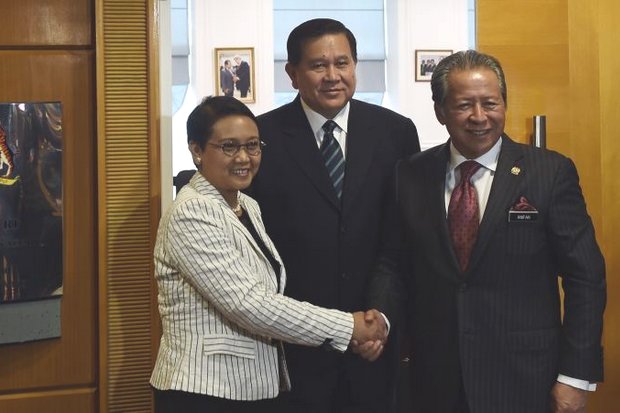
Thailand is prepared to help the thousands of boat people in the region only by extending humanitarian assistance, despite Malaysia and Indonesia agreeing to provide temporary shelter, Prime Minister Prayut Chan-o-cha says.
"Thailand is midway, so we have more problems [than other countries]. In terms of policy, we agree to help but all remains to be discussed," he said.
The country will provide humanitarian assistance to irregular migrants, but not allow them to stay on Thai soil, he said Wednesday.
The boat people are mainly Rohingya from Myanmar and those from Bangladesh and have been left stranded after Thailand cracked down on trafficking networks in the southern provinces.
- May 29 conference: Myanmar backs down, agrees to attend
Gen Prayut's comments came after Foreign Minister Tanasak Patimapragorn met the foreign ministers of Malaysia and Indonesia in Putrajaya, Malaysia, Wednesday.
Malaysia, Indonesia and Thailand said after the meeting they would continue to uphold their responsibilities under international law and their respective domestic laws, including the provision of humanitarian assistance to irregular migrants.
Indonesia and Malaysia agreed to continue to provide humanitarian assistance to the 7,000 irregular migrants still at sea.
"We also agree to offer them temporary shelter provided the resettlement and repatriation process will be done in one year by the international community," they said in a joint statement.
"In the meantime, Malaysia and Indonesia invite other countries in the region to join in this endeavour."
In addition, the three countries called upon the international community to uphold its responsibility and urgently share the burden of providing support, particularly financial assistance, to provide temporary shelter and humanitarian assistance.
The international community needs to take responsibility for the repatriation of the irregular migrants to their countries of origin or resettlement to third countries within a period of one year, the countries said.
Thousands of boat people have swum to shore or been rescued off the three countries over the past three weeks after Thailand started its crackdown, which prompted some of the trafficking syndicates involved to abandon their migrant victims at sea.
Also on Wednesday, army commander Udomdej Sitabutr called on international organisations and other countries to get in on the act in their efforts to ensure human rights protection for Rohingya migrants.
"Thailand is making its best efforts to handle the Rohingya situation as a country on the transit route and the critics should lend a hand," Gen Udomdej said.
When Rohingya migrants ventured into Thai waters, authorities were required to examine and provide them with necessities.
Migrants who did not want to go to a third country would be detained and under Thai law be treated as illegal migrants, which was not a human rights violation, he said.
He insisted Thai authorities had not forced the Rohingya boat people back out to sea as had been claimed.
He said those people did not want to come to Thailand, which is only a transit point to third countries. He said Thailand had given them full humanitarian assistance.
"We are being watched by certain foreign agencies who may not understand the situation," he said.
"This is what we have done. And if they can, those who are working to protect the human rights of the Rohingya migrants should help us.
"If they have sympathy and if their countries are ready, they can take the Rohingya."
The United Nations High Commissioner for Refugees said it was ready to work with countries in the region to find solutions, which may include returning people to their home countries voluntarily once conditions allow.
Meanwhile, Myanmar said it is making "serious efforts" to prevent the Rohingya exodus from Rakhine State.
The quasi-military government has denied any internal conflict in Rakhine and said the issue was one of human trafficking.
"Preventive measures on smuggling and illegal migration are being implemented nationwide," its Ministry of Foreign Affairs said.